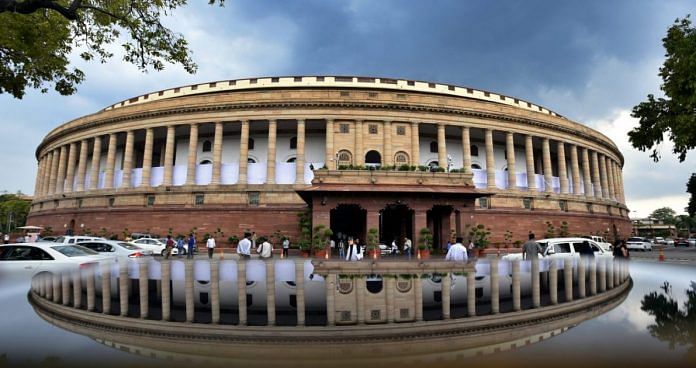The Law Commission is not expected to take a stand for or against simultaneous elections. Its report will be made public Tuesday.
New Delhi: Holding simultaneous elections to the Lok Sabha and state assemblies will not be possible unless the Constitution is amended, the Law Commission of India is expected to say in its report due to be made public Tuesday.
But the panel is not expected to support or oppose the idea which is being pushed strongly by Prime Minister Narendra Modi and BJP president Amit Shah.
Modi had only on Sunday said in his Mann ki Baat that the idea of simultaneous polls was gaining momentum.
A top official in the Law Commission told ThePrint that the panel report will say that unless Parliament amends Articles 83(2) and 172 of the Constitution, simultaneous polls would be in violation of a basic tenet — that the Lok Sabha and state assemblies cannot have a tenure of more than five years.
Also read: Law Commission set to recommend simultaneous polls, says it won’t hurt India’s federalism
Essentially, this means that ‘one nation, one election’, which the Modi government has strongly pushed for since it came to power in 2014, cannot become a reality without both the houses of Parliament passing amendments with two-thirds majority — a prerequisite for constitutional amendments. These amendments would then also have to be cleared by at least half of the state assemblies.
“It is ultimately the Parliament which needs to amend the Constitution in order to allow postponement of polls beyond five years, in order to synchronise elections in the Centre and states…Without doing that, simultaneous polls will be impermissible,” the official said.
“If the amendments are brought, then extending the tenure of the government without imposing President’s Rule will not be illegal.”
For example, if these amendments are put in place, the assembly elections in Madhya Pradesh, Rajasthan, Chhattisgarh and Mizoram — due at the end of this year — could be postponed and conducted with the Lok Sabha polls due in 2019. However, doing so in the absence of the amendments would be impermissible.
Won’t undermine federal structure of India
As first reported by ThePrint, the commission, in its over-100 page report, is going to state that holding simultaneous elections will not undermine the federal structure of India, since federalism is not applied in the strict legal sense of the term here.
While several political parties have contended that simultaneous polls go against the federal spirit of the Constitution — by giving the central government the right to call elections in states — none have been able to prove exactly which constitutional provisions will be violated.
Also read: Don’t oppose simultaneous elections just because it is Narendra Modi’s idea
“In India, there is quasi-federalism for administrative convenience, and not in the true spirit, so simultaneous polls cannot harm the federal structure,” the official said.
While the Commission will enlist the provisions required for holding polls at the Centre and states simultaneously, it will not recommend holding local body elections at the same time. “An obvious problem with that is that while the Election Commission of India conducts elections for states and the Centre, the state election commissions do so for local body elections,” another senior official of the Law Commission said.




An idea whose time has passed, as far back as 1967, when the all India hegemony of the Congress broke down. The party won handsomely, from time to time, but the inevitability of victory was lost. 2014 was a unipolar – with the benefit of hindsight, perhaps also a transient – moment. The South and the East now stand largely impregnable. The exceptional conversion of votes into seats in the core will encounter a higher index of opposition unity. The constructive takeaway for the future is to assign higher priority to governance and development, not to be always in election mode.